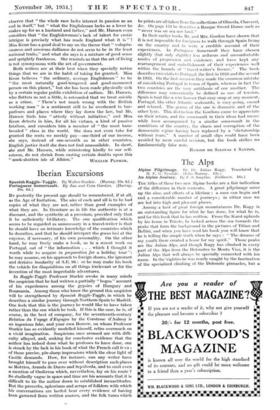Iberian Excursions BY posterity the present age should be remembered,
if at all, as the Age of Imitation. The aim of each and all is to be bad copies of what they are not, rather than good examples of what they are. In literature as in life the authentic is at a discount, and the synthetic at a premium, provided only that it be sufficiently titillatory. The one qualification which seems to be regarded as unnecessary in a travel-writer is that he should have an intimate knowledge of the countries which he describes, and that he should interpret the genus loci at the expense, if necessary, of his own personality. On the other hand, he may freely make a book, as in a recent work on Portugal, out of " the information . . . which I thought it worth while to acquire in preparation for a holiday tour ": he may assume, on his approach to foreign shores, the ignorant and derisive insularity of S.E. 96 : or he may make his book the vehicle for disquisitions on all things irrelevant or for the invention of the most improbable adventures.
In Raggle-Taggle Professor Starkie awoke in many minds the suspicion that he had written a partially " bogus " account of his experiences among the gypsies of Hungary and Roumania. Among those who know the ground this suspicion will be strengthened by Spanish Raggle-Taggle, in which he describes a similar journey through Northern Spain to Madrid. One feels that this is the journey he would like to have taken rather than the one which he took. If this is the case, he is, of course, in the best of company, for the seventeenth-century Relation du Voyage d'Espagne by the Comtesse d'Aulnoy is an ingenious fake, and your own Borrow, on whom Professor Starkie has so evidently modelled himself, relies overmuch on a vivid imagination. Suspicions once aroused are with diffi- culty allayed, and, seeking for conclusive evidence that the author has indeed done what he professes to have done, one is struck by the lack in his book of what the French call le en ; of those precise, pin-sharp impressions which the clear light of Castile demands. How, for instance, can any writer have brought himself to pass over without description such places as Motrico, Aranda de Duero and SepUlveda, and to omit even a mention of Ondtrroa which, nevertheless, lay on his route ? So studiedly vague in space and time are his accounts that it is difficult to tie the author down to established inexactitudes. But the proverbs, aphorisms and scraps of folklore with which his conversations are larded bear every evidence of having been garnered from written sources, and the folk tunes which
he prints are all taken from the collections of Olmeda, Chavarri, &e. On page 153 he describes a Basque Sword Dance such as " never was on sea nor land."
In their earlier books Mr. and Mrs. Gordon have shown that it is not impossible for foreigners to walk through Spain living on the country and to write a credible account of their experiences. In Portuguese Somersault they have chosen slightly (but only slightly) less arduous and uncomfortable modes of progression and existence, and have kept any rearrangement and embellishment of their experiences welt within the bounds of " travel-writer's licence." The book describes two visits to Portugal, the first in 1926 and the second in 1933. On the first occasion they made the common mistake of considering Portugal in terms of Spain, whereas in fact the two countries are the very antithesis of one another. The difference may conveniently be defined as one of tension. Spain is taut like a wire hawser that may snap at any moment. Portugal, like other Atlantic seaboards, is easy-going, casual and relaxed. The genius of one is dramatic and of the other lyric. This distinction the Gordons came to appreciate on their return, and the somersault in their ideas had mean- while been accompanied by a similar somersault in the conditions of the country, the chaos and corruption of the democratic rigime having been replaced by a "dictatorship without tears." A number of small slips could have been avoided by more careful revision, but the book strikes no fundamentally false note.
RAMIRO DE SALINAS Y SANTOS.










































 Previous page
Previous page